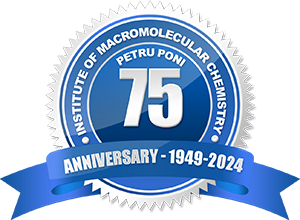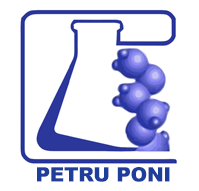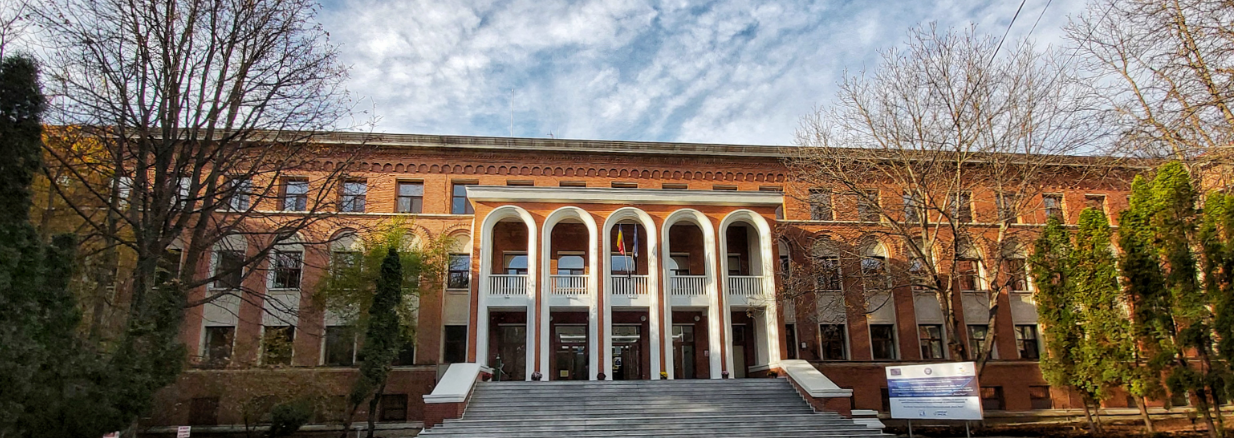|
|
- -
| Project: Advanced 3D intelligent magnetic supports for bone tissue engineering and regeneration |
|
Project status: Ongoing |
Project last day: 0000-00-00 |
Project: PN-III-P2-2.1
Acronym: 3D SMARTMAGTISS
Responsible partner (ICMPP): Dr. Aurica P. Chiriac
|
|
| Project: Antitumoral Theranostic Platforms Based nn Carbon Dots and Polymer Matrices
|
|
Project status: Ongoing |
Project last day: |
Project: PN-III-P1-1.2-PCCDI-2017-0083
Acronym: TERADOT
Director partner PPIMC: Dr. Mariana PINTEALA
Duration: 2018 – 2020
The TERADOT consortium will implement this project with the aim of reaching its strategic objective: the consolidation of the consortium scientific and technical competencies (in particular those of the P3 partner with relaunch potential) in the field of econanotechnologies and advanced materials by supporting/ developing the existing research competences and the transferability of its research results. The TERADOT Consortium is an alliance that will devote its efforts to capitalize the potential of nanotechnologies by creating new teranostic platforms based on Carbon Dots (CDs) in order to radically change the proceedings to diagnose and treat cancer.
http://www.ch.tuiasi.ro/cercetare/proiecte/TERADOT/ |
|
| Project: COMPAS – Cointegration of Microelectronics and Photonics for Air and Water Sensing |
|
Project status: Ongoing |
Project last day: 2027-12-31 |
Project: HORIZON-CL4-2023-DIGITAL-EMERGING-01-51 (RIA)
Contract nr. 101135796
Coordinator: SINTEF Norway
ICMPP main contract: Dr. Mariana-Dana DAMACEANU
Period: 2024-2027
COMPAS has as main objective to develop a compact, inexpensive and ultrasensitive PIC sensing platform (PSP) for air and water monitoring, relying on the co-integration of light source, detectors and electronic IC for on-chip signal processing.
The PIC sensor principle will be based on interference between two guided light modes, one of which interacts with analytes and the other being a reference. The resulting intensity changes offers excellent sensitivity to changes in concentration of analytes in air or solution. Multiple light paths can be placed on the same device offering multi-analyte sensing in an ultracompact device. COMPAS builds a first-of-a-kind fully integrated system around this principle (including light source, detectors and signal processing). The COMPAS PSP begins at TRL2 and will end with TRL5 validation in relevant environment by end-users towards air and water monitoring.
https://icmpp.ro/compas/
https://eucompas.net |
|
| Project: Development of photosensitized nanoparticles-hydrogel composites with catalytic properties for environmental applications |
|
Project status: Ongoing |
Project last day: 2026-12-31 |
Project: PN-IV-P2-2.1-TE-2023-2005
Acronym: PhotoActComp
Project Leader: Dr. Nicusor FIFERE
Duration: 2025 – 2026
To meet the challenges of extensive agriculture, a wide range of pesticides is currently applied, many of them irrationally, especially in developing countries. Their spread in the environment led to the pollution of surface and ground water over time. This forced the international community to look for new effective measures to neutralize these ‘contaminants of emerging concern’. The current project proposes the neutralization of pesticides through photochemical degradation, using sensitized recoverable photocatalysts and solar energy. Modern techniques based on ZnO nanoparticles sensitized with photosensitive organic compounds, which activate the nanoparticles by irradiation in the visible light range, are envisaged. To enhance the efficiency and recoverability of the sensitized photocatalyst, its incorporation into a porous environmentally friendly hydrogel matrix will be explored. Thus, the sorption of pesticide formulations would be facilitated within the pores of the hydrogel matrix, at the level of the photocatalyst, enhancing thus the photodecomposition reactions. The synergy of processes that give functionality in the visible spectral range of light with the reuse ability is expected to bring the photocatalytic composites among the best performing pesticide neutralization technologies.
https://icmpp.ro/projects/l4/about.php?id=176 |
|
| Project: Dynamic Constitutional Platforms for Targeted Drug Delivery
|
|
Project status: Ongoing |
Project last day: 0000-00-00 |
Project: PN-III-P1-1.1-TE-2016-1180
Acronym: DynaCoPlat
Project coordinator: Dr. Lilia CLIMA
Duration: 2018 – 2020
The next level in Drug Discovery is the easy building and self-generation of multifunctional nanostructures from commercially available or “easy to prepare” units, which will further self-assemble in a complex, tunable and multifunctional materials, suitable for very specific targeted drug delivery. In this regard, DynaCoPlat project’s main objective is to create dynamic nanoplatforms for developing dynamic systems for enhanced multivalent biorecognition with applications in targeted drug delivery. Project’s subject “the development of efficient nucleic acid targeted delivery systems” addresses the thematic priorities of the National Development Plan 2014-2020 programs (PN III) and Horizon 2020 strategy. The project will adopt modern synthetic pathways for preparing dynamic nanoplatforms with self-assembly properties based on dynamic chemistry and combinatorial methodology. The simplicity of the synthetic constitutional strategy using accessible and simple building blocks for facile self-generated nanoplatforms, presenting synergistic DNA and cell membrane affinities, can be considered as a valuable path toward the systematic discovery of active delivery systems. An important issue we aim to address is establishing a methodology for labelling of nanoplatforms with targeting molecules and achieve successful targeting property via introduction of selective cellular markers, thus increasing the efficacy and reducing the overall toxicity of therapeutic agents. On the other side, the STRATEGIC OBJECTIVE of DynaCoPlat project is the formation and consolidation of a young multidisciplinary team of researchers with complementary knowledge and experience, able to increase their scientific visibility and integration into scientific environment by publishing the results in high impact journals and application to competitions within the national and European Framework (H2020, Era-Net, Euronanomed, etc.).
http://www.intelcentru.ro/DynaCoPlat/home |
|
| Project: Employing “PEmPTech” in the Synthesis of Ion-Imprinted Polymer Architectures for Metal Ion Extraction from Wastewaters and Hydro Mining, acronym PEmPTech |
|
Project status: Ongoing |
Project last day: 0000-00-00 |
Project: PN-III-P4-PCE-2021-0306
Project manager: Dr. Andrei HONCIUC
Contract Authority: UEFISCDI
Contractor: "Petru Poni" Institute of Macromolecular Chemistry
Period: 2022-2024
In this proposal we aim at expanding the application potential of Pickering Emulsion Polymerization Technology (PEmPTech) to produce advanced ion-imprinted polymer (IIP) architectures ranging from colloidosomes, microparticles, monoliths, films for metal ion extraction and recovery from wastewaters and hydro mining. The key elements differentiating PEmPtech from all other ion-imprinting technologies is the use of Pickering emulsions which are stabilized by amphiphilic Janus nanoparticles (JNPs). JNPs with tunable amphiphilic balance can emulsify virtually any liquid monomers, monomer mixtures and ligands to produce ultrastable emulsions suitable for subsequent polymerization. However, pseudoamphiphilic homogeneous nanoparticles can also be used to stabilize Pickering emulsions. Which means that the current project is not restructed to ony JNPs. While the existing synthesis emulsification, precipitation and suspension polymerization technologies to produce IIPs are limited to trial-and-error process of identification of a particular set of monomer and ligand monomers that work in suitable synthetic conditions, we intend to demonstrate at the proof-of-concept level that PEmPTech utilizing amphiphilic JNPs can become a universal platform for facile production of various IIP architectures. The IIPs will be tested in laboratory conditions for metal ion absorption and extraction efficiency and selectivity from simple and complex ion matrices.
https://icmpp.ro/projects/l7/about.php?id=55 |
|
| Project: Formulation of bio-absorbable class III medical device for local drug delivery
|
|
Project status: Ongoing |
Project last day: 0000-00-00 |
Project: Research agreement no. 5289/09.08.2019 – CORTHOTEC LIMITED, London, UK
Acronym: CORTHOTEC
Project coordinator: Dr. Mariana PINTEALA
Duration: 2019 – 2020 |
|
| Project: Harnessing the multifunctionality of tailor-made polysaccharides to design nanostructured sorbents for wastewater treatment |
|
Project status: Ongoing |
Project last day: 2027-12-31 |
Project: PN-IV-P1-PCE-2023-1968
Acronym: MPSorb
Project Leader: Dr. Maria Valentina DINU
Duration: 2025 – 2027
Significant progress has been made in polymer science through collaborative efforts across different areas of chemistry. Emerging from combination of polymer materials with chemical transformations, a more efficient approach has been envisioned as promising alternative in synthesis of polymer architectures with multiple functions. Thus, tailor-made multifunctional polymer sorbents (MPSorbs) can be obtained in fewer synthesis steps by simultaneously combining two or more starting materials in a "one-pot" reaction. In this project, the “one-pot” concept is proposed to modify polysaccharides and develop nanostructured MPSorbs through self-assembly and cross-linking. The successful introduction of hydrophobic functional groups will allow the sorbents to effectively remove organic contaminants including oils, hydrophobic drugs, and/or complex pesticide formulations. At the same time, the non-modified hydrophilic moieties of polysaccharides will favor the adsorption of soluble pollutants, such as metal ions. Furthermore, the antimicrobial and antioxidant potential will be explored by introduction of natural active compounds (monoterpenes and/or phenolic acids) in synthesis of polysaccharide derivatives. The synergy between multiple functionalities is expected to pave the way for more efficient sorption systems that will lower the amount of material required to remove various contaminants, and thus reduce the production costs without compromising the adsorption features.
https://icmpp.ro/projects/l4/about.php?id=175 |
|
| Project: Institutul de Chimie Macromoleculara "Petru Poni" - Pol interdisciplinar de specializare inteligenta prin cercetare-inovare si transfer tehnologic in (bio/nano)materiale polimere si (eco)tehnologii
|
|
Project status: Ongoing |
Project last day: 0000-00-00 |
Project: POC F; 142/10.10.2016
Acronym: InoMatPol
Project coordinator: Dr. Narcisa Laura MARANGOCI
Duration: 2016 - 2019
Obiectivul general al proiectului InoMatPol consta in cresterea capacitatii, calitatii si eficientei activitatii CDI din ICMPP prin deschiderea de noi directii de cercetare si diversificarea gamei de servicii de cercetare orientate in special catre industrie – conform cerintelor de inovare ale agentilor economici din cadrul structurilor de tip cluster, in scopul stimularii competitivitatii cercetarii stintifice romanesti la nivel european si a competitivitatii economice nationale/regionale ale Institutului si ale actorilor economici in domeniul de specializare inteligenta eco-nano-tehnologii si materiale avansate.
http://http://inomatpol.icmpp.ro/ |
|
| Project: Intelligent therapies for non-communicable diseases based on controlled release of pharmacological compounds from encapsulated engineered cells and targeted bionanoparticles
|
|
Project status: Ongoing |
Project last day: |
Project: PN-III-P1-1.2-PCCDI-2017-0697
Acronym: INTERA
Project Component 4 (PC4) coordinator: Dr. Mariana PINTEALA
PC4: Polymeric conjugates for efficient induction of expression of genes of interest with applicability in cell therapy
Duration: 2018 – 2020
The complex project INTERA aims to develop innovative therapeutic methods to ameliorate the pathological progression by reducing the inflammatory process. The multidisciplinary studies proposed by INTERA can create and define new nano- or micro-medical devices usable for smart and innovative anti-inflammatory therapies. INTERA includes 4 projects: (1) Encapsulation of genetically manipulated eukaryotic cells for controlled release of pharmacologically active products; (2) Development of a 3D platform designed for pre-clinical drug testing composed of cells incorporated into three-dimensional bio-matrices; (3) Intelligent nanobioparticles designed for specific targeting of bioactive compounds to pathological sites to reduce (treat) vascular inflammation. (4) Polymeric conjugates to induce efficiently the expression of genes of interest with applicability in cellular therapy.
http://www.icbp.ro/static/en/en-networking_grants-grants-national_grants/intera.html |
|
| Project: Intelligent therapies for non-communicable diseases, based on the controlled release of pharmacological compounds from cells encapsulated after genetic manipulation or vectorized bionanoparticles |
|
Project status: Ongoing |
Project last day: 0000-00-00 |
Project: PN-III P1-1.2-PCCDI-2017-0697
Acronym: INTERA
Responsible partner (ICMPP): Dr. Gheorghe Fundueanu
Duration: 2018-2020
Buget: 1,380,000 lei
The INTERA complex project aims to develop innovative therapeutic methods that, by reducing the inflammatory process, will improve the pathological processes. INTERA includes multidisciplinary studies that only together can create and define new medical nano- or micro-devices that can be used for intelligent and innovative anti-inflammatory therapies. INTERA includes 4 projects: (1) Encapsulation of genetically manipulated eukaryotic cells for the controlled release of some pharmacologically active products (2) Creating a 3D platform designed for pre-clinical drug testing consisting of cells incorporated into three-dimensional bio-matrices; (3) Intelligent nanobioparticles designed for vectoring bioactive compounds to pathological sites for the therapy of vascular inflammation (4) Polymer conjugates for the efficient induction of expression of genes of interest with applicability in cell therapy. The consortium consists of 4 partner research units - two institutes of the Romanian Academy (IBPCNS, ICMPP), a university (UPB) and a national CD institute (INCDFM) with good territorial coverage (Bucharest-Ilfov-Iași).
http://www.icbp.ro/static/en/en-networking_grants-grants-national_grants/intera.html |
|
| Project: Micro/nanomotors based on glycopeptide designed for the delivery of antitumor drugs |
|
Project status: Ongoing |
Project last day: 0000-00-00 |
Project: PN-III-P1-1.1-PD-2019-0271
Acronym: GlyPepTum
Project Leader: Dr. Alina G. Rusu |
|
| Project: Mimicking living matter mechanisms by five-dimensional chemistry
|
|
Project status: Ongoing |
Project last day: |
Project: PN-III-P4-ID-PCCF-2016-0050
Acronym: 5D-nanoP
Project coordinator: Prof. Aatto LAAKSONEN
Duration: 2018 – 2022
Mimicking of the living matter mechanism of cooperation by complementarity represents one of the most challenging tasks of supramolecular chemistry. The momentary solution consists in using particularly designed molecular unimers, endowed with the necessary amount of chemical information.
The 5D-nanoP project is dedicated to interfacing the fundamental research area of constitutional dynamic chemistry with the practical approaches of medicinal chemistry and biomedical applications. In the spirit of a metaphor of Jean-Marie Lehn (Nobel Prize in Chemistry, 1987), the project aims to materialize the concept of 5D chemistry in designing, synthesizing, characterizing, and using molecules with conditional affinity, to build versatile supramolecular nanoplatforms able to vectorize compounds of pharmaceutical or biochemical relevance, all of them involved in physiologic and pathologic processes at cell- and tissue-level.
http://www.intelcentru.ro/5D-nanoP/ |
|
| Project: New hybrid polymer / peptide hydrogels as innovative platforms designed for applications in cell cultures |
|
Project status: Ongoing |
Project last day: 0000-00-00 |
Project: PN-III-P2-2.1-PED2019-2743
Acronym:
Project Leader: Dr. Loredana E. Nita
|
|
| Project: New porous coordinating polymers with variable dimensions organic ligands for gas storage
|
|
Project status: Ongoing |
Project last day: |
Project: POC E; P_37_707/31.08.2016
Acronym: POCPOLIG
Project coordinator: Dr. Vasile LOZAN / Project manager: Dr. Narcisa Laura MARANGOCI
Duration: 2016 - 2020
The objective of the project is to increase the capacity and quality of the research and innovation development activity by attracting specialists with advanced skills, opening a new research direction in the field of metal-organic networks (MOF) and diversifying the range of research services and transferring them to industrial partners, in order to stimulate the competitiveness of the Romanian scientific research at European level and of the national/regional economic competitiveness of the Institute and of the economic actors in the field of intelligent specialization of eco-nano-technologies and advanced materials.
http://pocpolig.icmpp.ro/ |
|
| Project: Supramolecular Semiconducting Materials for Organic Electronics, acronym SUPRAMOL-MAT |
|
Project status: Ongoing |
Project last day: 0000-00-00 |
Project: PN-III-P4-PCE-2021-0906
Project manager: Dr. Aurica FARCAS
Contract Authority: UEFISCDI
Contractor: "Petru Poni" Institute of Macromolecular Chemistry
Period: 2022-2024
The interest in the area of semiconducting polymers (SMPs) for organic electronics has intensified during the past few decades as a consequence of their numerous advantages over conventional inorganic materials. Being in direct competition with inorganic thin-film and crystalline silicon photovoltaic (PV), there are still many points for improving SMPs`s charge carrier mobility that is the main difference between these organic and inorganic materials. This is why there is a lot of research interest for improving the electronic properties of SMPs. Recently, so-called supramolecular SMPs have been recognized as promising materials that attracted much attention for optoelectronics. These supramolecular compounds exhibit a crucial importance for further development of organic electronics and represent a key bottom-up strategy to build and process relatively soft functional materials. The design and synthesis of such supramolecular SMPs of polypseudorotaxanes (PPs) or polyrotaxanes (PRs) types open the gates to unprecedented opportunities in many fields of science and technology. On the basis of our previously studies, it was found that the supramolecular encapsulation of SMPs backbones is effective in preventing aggregation and hindering fluorescence quenching, even when only a small fraction of the conjugated backbone is encapsulated. Therefore, our proposal is aiming to investigate a series of new and original supramolecular SMPs and to select the most promising materials directly for construction of innovative devices or new classes of biomimetic ionic channels that will be safe for human and environment. These newly proposed supramolecular architectures will be contributing forces and no doubt will lead to interesting results. In addition, the accomplishment of the scientific objectives themselves will give the team members an excellent training in a multidisciplinary field at the intersection of organic synthesis, supramolecular and polymer chemistry as well material science for the generation of active layer for organic electronic devices.
https://icmpp.ro/projects/l7/about.php?id=50 |
|
|
|








